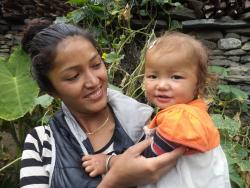Spillover Effect of Keeping Poultry in Semi-Intensive Coops
“I was inspired to construct a semi-intensive poultry coop after learning about its importance during a mothers’ group meeting at Tachai village. I could not continue to stand by while my poultry was ruining my neighbor’s Homestead Food Production (HFP) garden.” These are the words of Mr. Karna Ghale, a resident of Tachai village. Though his family is not a HFP beneficiary, he has set a wonderful example for his community by being the first to adopt the practices that Suaahara promotes.

Karna Ghale of Tachai Village
Tachai is a remote village in the Manang district of Nepal, where the main occupation among its residents is farming. Suaahara selected nineteen households in Tachai to be beneficiaries of the program, distributing 95 improved breeds of poultry among the households at the rate of five birds per home.
Suaahara is a USAID funded integrated nutrition program, and has been promoting semi-intensive backyard coops to families who own poultry in order to preserve HFP gardens. The main objective of the Suaahara program is to supplement animal-source foods to families of children of two years or younger, a period where proper nutrition is extremely important for a child’s development. One of the ways Suaahara provides animal-source foods to its beneficiaries is by supplying them with improved breeds of poultry. Suaahara requires that these families construct semi-intensive coops as a pre-requisite for providing the poultry in order to ensure bio-security and increased production.
After constructing their semi-intensive coops, HFP beneficiaries in Tachai attended a Health Mother Group meeting lead by one of Suaahara’s Female Community Health Volunteers, Om Maya Ghale, to discuss the importance of semi-intensive coops in HFP gardening. To promote the practice of keeping poultry in semi-intensive coops, the group decided that households that did not keep their poultry in semi-intensive coops would have to pay a fine of NRs 50.00 (50 Nepalese Rupees) per bird.
Once this campaign began, Karna Ghale was the first to follow the group’s requirements. However, a number of households failed to construct semi-intensive coops for their poultry, causing the Health Mother Group to collect NRs 1750.00 within one month of instituting the penalty. The group met again and decided to raise the penalty to NRs 100.00 with the objective of having all 37 poultry-growing households in Tachai keep their poultry in semi-intensive coops.
During one of the meetings, a woman named Dhan Kashi Gurung brought up the concern that she did not have enough land to construct a semi-intensive coop. Her neighbor, Sangeeta Gurung then came forward to offer help. Now, both women keep their poultry in Sangeeta’s coop and are collectively taking care of the birds.

Deepa Gurung and her 15-month-old daughter
Deepa Gurung, a 25 year old mother of two and Tachai native, expressed, “Before Suaahara, we used to practice an open ranging system of poultry keeping, unknowingly exposing our children to the risk of contracting a number of diseases that result from contact with poultry litter. Also, our birds would occasionally damage the vegetables in our neighbors’ gardens, which resulted in a lot of tension between us and our neighbors. Thanks to Suaahara, now we have semi-intensive coops to protect our children from poultry litter related infections, in addition to ensuring the safety of our and our neighbors’ HFP gardens.”









